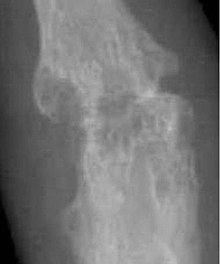Arthropathy
Appearance
(Redirected from Joint Disease)
| Arthropathy | |
|---|---|
| Other names | Joint disease |
 | |
| Bone erosions from rheumatoid arthritis.[1] | |
| Specialty | Rheumatology |
An arthropathy is a disease of a joint.[2]
Types
[edit]Arthritis is a form of arthropathy that involves inflammation of one or more joints,[3][4] while the term arthropathy may be used regardless of whether there is inflammation or not.
Joint diseases can be classified as follows:[citation needed]
- Infectious arthritis
- Septic arthritis (infectious)
- Tuberculosis arthritis
- Reactive arthritis (indirectly)
- Noninfectious arthritis
- Hemarthrosis (joint bleeding)
- Synovitis is the medical term for inflammation of the synovial membrane.
- Joint dislocation
With arthropathy in the name
[edit]- Reactive arthropathy (M02-M03) is caused by an infection, but not a direct infection of the synovial space. (See also Reactive arthritis)
- Enteropathic arthropathy (M07) is caused by colitis and related conditions.
- Crystal arthropathy (also known as crystal arthritis) (M10-M11) involves the deposition of crystals in the joint.
- In gout, the crystal is uric acid.
- In pseudogout/chondrocalcinosis/calcium pyrophosphate deposition disease, the crystal is calcium pyrophosphate.
- Diabetic arthropathy (M14.2, E10-E14) is caused by diabetes.
- Neuropathic arthropathy (M14.6) is associated with a loss of sensation.
Spondylarthropathy is any form of arthropathy of the vertebral column.[5]
Signs and symptoms
[edit]Joint pain is a common but non-specific sign of joint disease. Signs will depend on the specific disease, and may even then vary. Common signs may include:[citation needed]
- Decreased range of motion
- Stiffness
- Effusion
- Pneumarthrosis, air in a joint (which is also a common normal finding).
- Bone erosion
- Systemic signs of arthritis such as fatigue
Diagnosis
[edit]Diagnosis may be a combination of medical history, physical examination, blood tests and medical imaging (generally X-ray initially).[citation needed]
Treatment
[edit]This section is empty. You can help by adding to it. (June 2022) |
References
[edit]- ^ Ideguchi, Haruko; Ohno, Shigeru; Hattori, Hideaki; Senuma, Akiko; Ishigatsubo, Yoshiaki (2006). "Bone erosions in rheumatoid arthritis can be repaired through reduction in disease activity with conventional disease-modifying antirheumatic drugs". Arthritis Research & Therapy. 8 (3): R76. doi:10.1186/ar1943. ISSN 1478-6354. PMC 1526642. PMID 16646983.
- ^ "arthropathy" at Dorland's Medical Dictionary
- ^ "arthritis". TheFreeDictionary.com. March 2, 2019. Retrieved October 30, 2023.
- ^ Youngson, Dr. Robert (December 20, 2017). "ARTHRITIS definition and meaning". Collins English Dictionary. Retrieved October 30, 2023.
- ^ "Spondyloarthropathy". TheFreeDictionary.com. December 15, 2008. Retrieved October 30, 2023.
